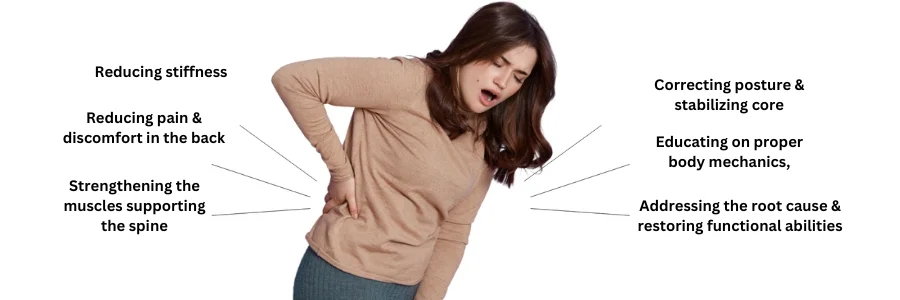
Break Free from Back Pain.
Low Back Pain projected to impact 843 million people globally by 2050.
Back pain due to long work hours is a common issue faced by those who have jobs that require prolonged periods of sitting. Also known as “work-related musculoskeletal disorder”, this type of pain can have a significant impact on one’s overall well-being. If long work hours strain your back and give you a nagging, discomforting back pain, take charge. Access the best physiotherapy for back pain.
Has this been happening to you lately?
Stiffness
Limited flexibility or a feeling of stiffness in the back
Discomfort
Continuous or recurrent discomfort or pain in the back
Cramps
Muscle cramps or spasms affecting the back.
Sciatica
Shooting, intense pain traveling down the legs
Ache
Persistent, dull pain in the lower back region.
Aggravation
Pain intensifying with specific movements like bending, lifting, or twisting.
Sensations
Numbness or tingling sensations in the back, buttocks, or legs
Mitigation
Soreness or unease alleviates with rest or changes in posture.
What might be the source of the back pain?
Did you recently strain your muscle while lifting a heavy object or engage in sudden strenuous activity? Do you sit for long hours with a rather poor posture? These could be reasons for your back pain. It could happen due to sudden movements, poor posture, and age-related changes in the spine. Additionally, herniated discs, spinal abnormalities, osteoarthritis, and certain medical conditions, such as kidney stones or infections, can also contribute to back pain.
Physiotherapy for Back Pain provides relief by

FAQs related to Back Pain
What are the most common causes of back pain?
The most common causes of back pain include strained or sprained muscles, poor posture, and changes in the spine brought on by aging. Herniated discs, deformities of the spine, and underlying illnesses including osteoarthritis are other prevalent but not so common causes.
Is there a way I can prevent back pain?
Yes, you can prevent back pain by maintaining a healthy weight, staying active with regular exercise, practicing proper body mechanics during daily activities, using supportive furniture and ergonomic equipment, and avoiding prolonged sitting or standing. Physiotherapy for back pain is known to provide relief and physiotherapists also suggest preventive methods.
If my back hurts, should I limit my mobility?
While it is important to avoid activities that make your back discomfort worse if you have them, restricting your full range of motion is not advised. To keep flexible and avoid stiffness, regular, mild exercise and gentle motions may be helpful.
Will a standing desk improve my back pain?
Some people may find relief from back pain by using a standing desk, which encourages improved posture and relieves pressure on the spine. To prevent potential strain, it is necessary to use a standing desk with suitable ergonomics and posture.
Will laying on the ground help with back pain?
Some people may find short relief from back discomfort by lying down, especially when it is combined with gentle stretching. It might not, though, deal with the source of the discomfort. Finding the right therapies and exercises to efficiently manage and relieve back pain requires consulting a healthcare specialist.
What types of stretches can I do to relieve back pain?
To relieve back pain, try gentle stretches like the cat-cow stretch, child’s pose, knee-to-chest stretch, and pelvic tilts. Additionally, incorporate lower back stretches, hamstring stretches, and piriformis stretches. Remember to perform stretches slowly and gently, and if the pain persists or worsens, consult a healthcare professional for personalized advice.
How do I know if I need back surgery?
The severity of your illness and how it responds to non-surgical treatments like physiotherapy or medication will determine whether you require back surgery. To decide whether surgery is required, a healthcare practitioner can examine your medical history, do physical exams, and evaluate imaging data. To assist you in choosing the best course of action for your back ailment, they will go over the advantages, disadvantages, and potential risks of the various options as well as alternative treatments.
How to know if my back pain is serious?
Your back pain may be a sign of a more serious problem if it is strong and chronic, accompanied by tingling, numbness, or weakness in your legs, or if it develops soon after an accident or fall. Additionally, seeing a doctor is necessary to rule out any underlying conditions and choose the best course of therapy if the pain intensifies at night or interferes with everyday activities.
What will worsen my back pain?
Back pain may worse due to:
1. Stress and tension, leading to increased muscle tightness.
2. High-impact activities or sudden, jarring movements.
3. Prolonged sitting or standing in one position without breaks.
4. Lifting heavy objects incorrectly or using improper technique.
5. Poor posture during daily activities, such as slouching or hunching over.
Can stress lead to back pain?
Yes. Stress can aggravate back discomfort. Muscle tightness and tension brought on by emotional stress can make the back and other parts of the body uncomfortable. Stress can also worsen pre-existing back issues or increase a person’s risk of acquiring back discomfort. Back discomfort caused by stress can be relieved and prevented by managing stress through relaxation techniques, physical activity, and stress-reducing hobbies.
Does physiotherapy for back pain provide relief?
Yes, physiotherapy for back pain is a successful treatment that provides long-term relief. At Telephysio, we employ a variety of methods, including physical therapy exercises, manual treatment, and heat/cold therapy, to lessen back discomfort and increase flexibility and strength. Additionally, we educate people on proper body mechanics and posture, giving them the tools, they need to properly manage their back discomfort. The specific condition of the patient and compliance with the treatment plan are key factors in how well physiotherapy works.
Are painkillers necessary for back pain treatment?
Back pain can be managed with the use of painkillers, which also temporarily ease discomfort. They are not usually required for treatment, though. Back pain can be treated and prevented with different non-pharmacological methods like physiotherapy, exercise, and lifestyle changes. A healthcare practitioner should be consulted to decide the best course of action based on the degree and underlying cause of the back pain.
How will having back pain affect me? Can other problems develop?
Mobility and productivity might be impacted by back pain throughout regular tasks. There could be discomfort and a lower quality of life as a result. If left untreated, back pain can result in weak muscles, restricted range of motion, and bad posture, as well as persistent pain or other consequences. It is crucial to get the right assessment and care in order to stop more issues and keep up overall wellness.






